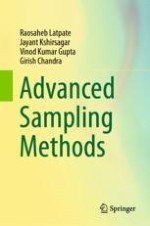2021 | OriginalPaper | Buchkapitel
8. Randomized Response Techniques
verfasst von : Raosaheb Latpate, Jayant Kshirsagar, Vinod Kumar Gupta, Girish Chandra
Erschienen in: Advanced Sampling Methods
Verlag: Springer Singapore
Aktivieren Sie unsere intelligente Suche, um passende Fachinhalte oder Patente zu finden.
Wählen Sie Textabschnitte aus um mit Künstlicher Intelligenz passenden Patente zu finden. powered by
Markieren Sie Textabschnitte, um KI-gestützt weitere passende Inhalte zu finden. powered by
